“Help, I’ve fallen, and I can’t get up!”
Life Alert didn’t create this slogan, but it popularized it, making “Life Alert” synonymous with “medical alert systems.” (1) The company has been around since 1987 and is still one of the most well-known medical alert brands.
Despite Life Alert’s prevalence, we don’t consider it one of the best medical alert systems. Many other companies offer lower monthly prices, more advanced features, transparent policy information, and don’t lock you into a multiple-year contract.
However, Life Alert offers some impressive features that may be right for you or your loved one. Since you can’t get pricing and policy information without sitting through a lengthy sales pitch over the phone, use our Life Alert review to learn all about the company’s pricing, service, and policy information.
Our favorite Life Alert medical alert system
The Micro Voice Pendant and HELP Button at-home package is our pick for the top Life Alert system. It’s one of the only at-home systems on the market with a two-way speaker in the wearable help button, not just the base unit. This is critical when users need help but aren’t near the base station because they can press the bracelet or necklace button and talk directly with the monitoring center agent.
Our picks for the best Life Alert medical alert systems
Compare Life Alert medical alert systems
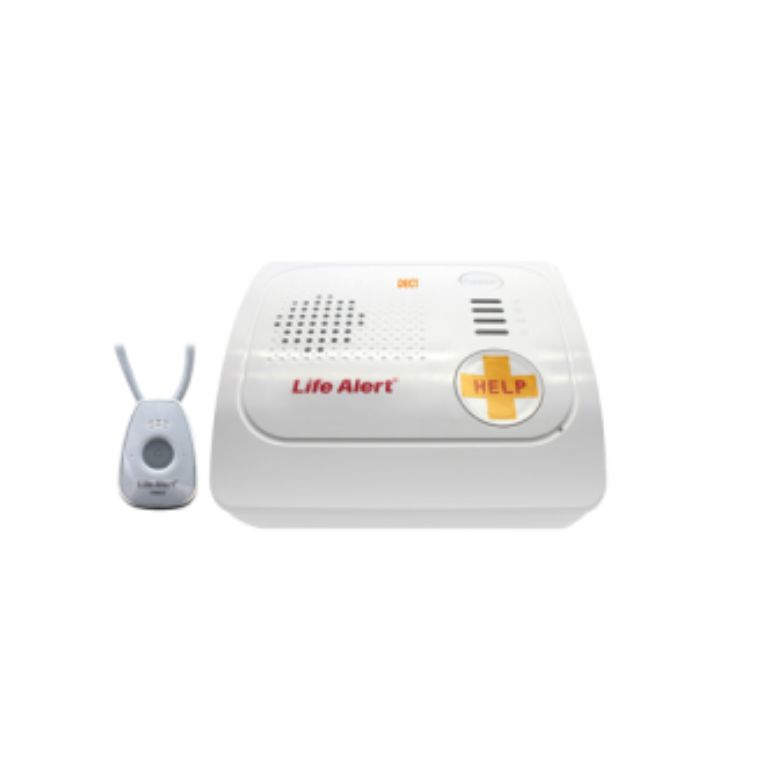
|
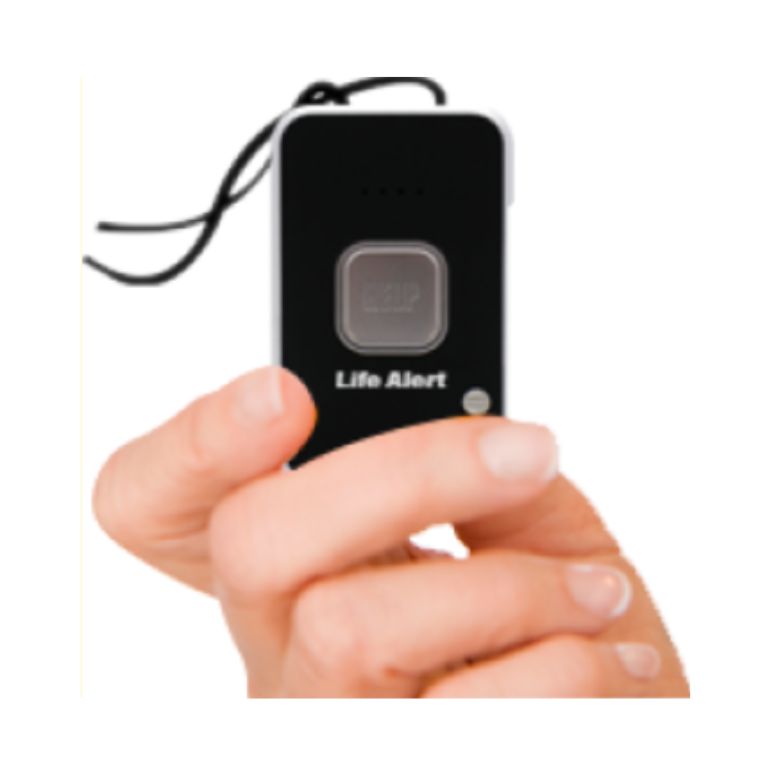
|
|
| Life Alert Micro Voice in Pendant and HELP Button | Life Alert Micro Voice in Pendant, HELP Button, and HELP On-the-Go GPS | |
| Rating | ||
| Firmness | $89.85* | $109.85* |
| Material | $248* | $248* |
| Cooling | N/A | N/A |
| Warranty | 72 hours (base unit), up to five years (wearable help button), up to 10 years (wall button) | 72 hours (base unit), up to five years (wearable help button), up to 10 years (wall button and mobile system) |
| Shipping | 1,000 feet | 1,000 feet (at-home), Unlimited (mobile system) |
*Prices not available online. You must call Life Alert for pricing information.
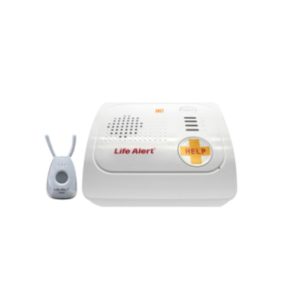

Key product features
What you should know
Life Alert’s Micro Voice Pendant and HELP Button are part of an at-home medical alert system that connects to a 24/7 monitoring center. When using the pendant or HELP wall button, you must be within 1,000 feet of the base unit to call the monitoring center.
- The wearable help button (you can choose a necklace or bracelet) and wall button have two-way speakers, a unique feature for an at-home medical alert system. This allows you to talk directly with the monitoring center agent during an emergency without being near the system’s base unit.
- The package has a high price tag of $89.85 per month plus a $248 one-time activation fee.
- We recommend the Micro Voice Pendant and HELP Button for those who only need monitoring in and around their homes. Since Life Alert doesn’t offer fall detection, it may not be the right medical alert system for anyone with a high risk of falling.
- The Micro Voice Pendant is waterproof, so it can be worn safely in the shower or bathtub. Waterproof devices can be submerged in water for up to 30 minutes. (2)
- Life Alert requires a strict three-year service contract. The contract can only be broken if the user moves to a long-term care facility, requires 24/7 care at home, is diagnosed with a serious medical condition, or dies.
Life Alert Micro Voice Pendant and HELP Button overview
Life Alert’s at-home system includes the base unit, Micro Voice Pendant, and HELP wall button. For your Micro Voice Pendant, you’ll choose either a medical alert necklace or bracelet when ordering your at-home system. Its unique two-way speaker allows you to contact the monitoring center as long as you’re within 1,000 feet of the base unit. When you press the pendant help button, an agent will talk to you through the small speaker around your neck.
The HELP wall button also connects to the monitoring center and has a two-way speaker. It’s about the size of a hamburger bun and can attach to a wall anywhere in your home. We recommend placing it near the ground in a high fall-risk area such as the bathroom, bedroom, or bottom of the stairs. (3)
Related post: How do medical alert systems work?
Specs
| Monthly cost | $89.85 |
| Trial period | N/A |
| Fall detection | N/A |
| Connectivity | Cellular |
| App | N/A |
| Available accessories | Lockbox (included order) |
Mystery shopping experience
We called a customer care specialist at the phone number listed on Life Alert’s website to learn more about its products, prices, and policies. The website is vague and doesn’t list prices or return and cancelation policies, so you must contact Life Alert for this information.
The first person we spoke with asked for our ZIP code and address so we could receive a free Life Alert brochure. Then, we were transferred to a customer care specialist. Our specialist was friendly and personable. She led our conversation with the following questions to learn more about our “loved one” and help us find the right device:
- Do they live alone?
- Have they fallen? Do they have any health concerns?
- Do they drive independently? Are they still active?
Based on our answers, the specialist recommended the Complete Service. This package includes the base unit, Micro Voice Pendant, HELP button, and HELP On-the-Go GPS and costs $109.85 per month. We wanted to learn more about a less expensive option and asked about Life Alert’s at-home system. The specialist said the at-home option includes the base unit, Micro Voice Pendant, and HELP button. They also said Life Alert devices aren’t available individually. For example, you can’t order the mobile system without including the at-home system.
Overall, we had a much better mystery shopping experience with Life Alert than in the past. While the sales call lasted almost an hour, the specialist was warm and personable. She genuinely tried to connect with us by sharing personal anecdotes about her loved ones aging and using Life Alert.
In the past, we’ve experienced Life Alert customer care specialists making false statements about competitors, bullying us into buying the service, and becoming pushy or aggressive when we didn’t sign up for the service during the sales call. This was a more welcoming experience.
Life Alert cost
Life Alert’s monthly costs are much higher than other popular elderly monitoring systems. The at-home system costs $89.85 plus a $248 one-time activation fee. Most at-home medical alert systems we’ve reviewed cost $30–$40 monthly, with some charging $25–$50 activation fees.
Life Alert offers a price-lock guarantee, meaning your monthly fee never increases while you’re a customer, even if the company raises its prices. You’ll also receive one free month of monitoring if you choose an annual subscription.
Fall detection
During our call, we asked if Life Alert had fall detection. Our specialist stated the company doesn’t offer fall detection because the technology “overpromises and underdelivers,” saying fall sensors go off simply from walking. After testing nearly a dozen fall detection devices in the past two years, our team has not had this experience. While some devices triggered false alarms when we handled them, this never happened just from walking while wearing them.
Medical alert systems with fall detection often have a disclaimer that the technology isn’t 100% accurate and encourage users to press the button for help when they can. Based on our experience testing fall detection, we think the sensors are an effective safety tool, especially for those with a high risk of falling.
According to Dr. Aneesha Dhargalkar, MD, “Over 30% of people over the age of 65 fall each year. Falls can be due to a variety of reasons, some less serious (such as tripping on something in your home) and some more serious (such as stroke and irregularities in heart rate). Therefore, fall detection should be considered an important feature for any home alert device.”
Life Alert accessories
The customer care specialist told us we’d receive a free lockbox if we signed up for the service that day. A lockbox stores your house keys in a safe, secure location outside your home. During an emergency, the monitoring center agent shares the lockbox code with first responders so they can enter your home without damaging the entrance.
There’s no information about a free lockbox on Life Alert’s website, so we’re unsure if this is an ongoing or limited promotion.
Life Alert customer reviews
Life Alert has a 4.8 out of 5-star rating on Trustpilot from an average of more than 580 customer reviews. Many positive reviews praise the sales process and customer service when ordering Life Alert. Reviewers found the sales representatives knowledgeable and helpful. Other customers say the equipment was simple to set up and test. Many reviewers say Life Alert’s services give them peace of mind.
“After my mom had a fall in her home, I knew I needed something to provide me peace of mind. Life Alert was an obvious choice. Each person I talked with was knowledgeable and helpful in answering questions and helping with the setup. I feel a huge relief that my mother will be able to call for help if there is a need.”
Kim C., Trustpilot Reviewer
Multiple negative reviews recount pushy, bullying tactics from sales representatives. At least two reviewers complained that sales representatives lied to them. Another reviewer said a rude sales representative verbally abused them and their husband.
Who Life Alert Micro Voice Pendant and HELP Button are recommended for:
Life Alert is one of the oldest and most well-known medical alert brands. Still, many other options have lower monthly fees, more advanced features, and flexible cancelation policies. When shopping for a medical alert system, consider your budget, needs, and lifestyle.
We think Life Alert is a good choice for:
- Those living alone but accompanied by a caregiver outside the home: If you only need monitoring in and around your home, we recommend the Life Alert Micro Voice Pendant and HELP Button.
People with a large home or yard: The 1,000-foot range between the base unit and pendant is nearly the length of three football fields (4), which should cover most homes and yards. Unlike many other at-home systems, you don’t need to be near the base station to speak with Life Alert’s monitoring center agent. The pendant’s two-way speaker allows you to talk to the agent directly from your necklace or bracelet.
Most people associate medical alert systems with medical emergencies, but you can contact the monitoring center for emergency and non-medical emergency situations, such as a fire, home intrusion, or being locked out of your home.
Who Life Alert Micro Voice Pendant and HELP Button are not recommended for:
- Anyone at risk of falling: Life Alert doesn’t offer fall detection, so those at a high risk of falling due to mobility or gait issues, a history of falls, poor vision, or taking four or more medications (5) should consider a medical alert system that automatically contacts the monitoring center when it detects a fall.
- Those prone to wandering: Life Alert’s at-home and mobile systems don’t offer caregivers real-time GPS tracking. GPS tracking is an important feature for users prone to wandering due to dementia, Alzheimer’s, or other cognitive issues. (6) Most medical alert watches, medical alert bracelets, and mobile systems include location tracking via a free caregiver app.
- People with an active lifestyle: Since the Micro Voice Pendant only works in and around the home, we don’t recommend this system for those who drive independently and participate in activities outside the home. Consider adding the HELP On-the-Go GPS to your package if you want the flexibility of connecting to the monitoring center anywhere with cell service.
- Those needing intensive, around-the-clock care: We don’t recommend any medical alert system for loved ones needing more intensive in-person caregiving and assistance. (7) (8)
Expert opinion
“The LifeAlert Micro Voice Pendant and HELP button package benefits a certain cohort of elderly individuals,” says Dr. Dhargalkar. “For those people with a relatively inactive lifestyle that primarily stay at home, this device can get you the help you need if you are experiencing a medical emergency. However, many medical emergencies experienced by elderly patients are related to falls, and this device does not offer fall detection. In addition, approximately 1 in 10 people over the age of 65 experience some form of dementia. One of the main signs of dementia is wandering or getting lost as a result of the cognitive decline characteristic of this condition. With this package, you cannot track your loved one if they wander off, increasing the risk of worsening outcomes from a medical emergency.”
How we rated the Life Alert Micro Voice Pendant and HELP Button
Due to the company’s three-year contract, we haven’t tested Life Alert medical alert systems. We conducted mystery shopping, spoke with customer care specialists, ordered a brochure, and thoroughly researched the brand to offer as much information about Life Alert as possible.
Read our full medical alert system methodology to learn more about our scoring process.
Warranties and policies
You must order Life Alert over the phone, not online. The company’s website doesn’t list pricing or detailed service information. You must also speak with a sales representative over the phone for the most up-to-date pricing and policy details.
Based on our mystery shopping experience, we found it difficult to call Life Alert for quick questions about pricing and services. While our sales representative was friendly and knowledgeable, we had to sit through an hour-long phone conversation to get simple pricing information.
Shipping
Shipping is free.
Trial period and return policy
Life Alert doesn’t offer a trial period and is the only medical alert company that requires a three-year contract. Unlike most companies that allow you to cancel at any time, the following are the only valid exceptions for canceling your Life Alert contract:
- Moving to a long-term care facility
- Receiving 24/7 in-home care
- Severe health diagnosis
- Death
If your loved one fits any of these exceptions, you must call customer service to begin the cancelation process. You’ll also need to submit proof supporting your reason for canceling. Life Alert covers return shipping costs for all equipment.
Warranty
Life Alert offers a free lifetime warranty for all equipment.
Additional models from Life Alert


Key product features
What you should know
Unlike most medical alert companies, Life Alert doesn’t offer separate or “a la carte” equipment. We confirmed with our sales representative that we couldn’t order the HELP On-the-Go GPS separately—it had to be included with the at-home system and wall button. This can be frustrating for shoppers who only need a mobile system and don’t want to pay over $100 monthly for the complete package.
- One of the biggest perks is that you never have to recharge your devices, so you can always wear them. The wearable help button, wall button, and mobile system have multi-year batteries. Life Alert monitors the battery and sends new equipment when it runs low.
- You can speak directly with the monitoring agent through the wearable help button, wall button, and mobile system. All devices have a two-way speaker.
- If you choose an annual subscription, you’ll receive a free month of monitoring.
- “The HELP On-the-Go GPS addition to the Life Alert package solves the issue of elderly individuals with dementia. By tracking these individuals wherever they are, significant complications secondary to medical emergencies can be more likely avoided,” per Dr. Dhargalkar, MD.
Life Alert vs. competitors

|
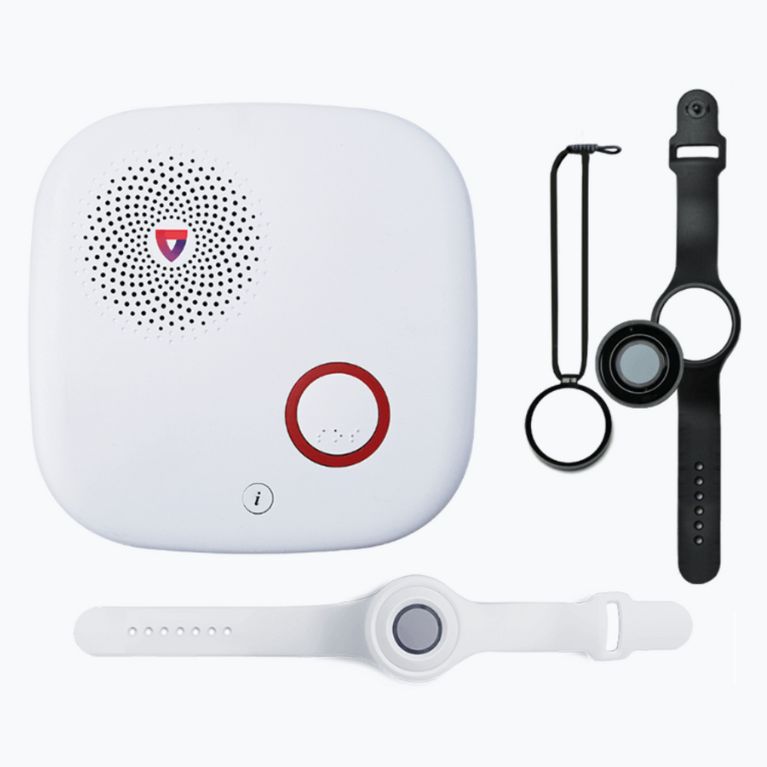
|
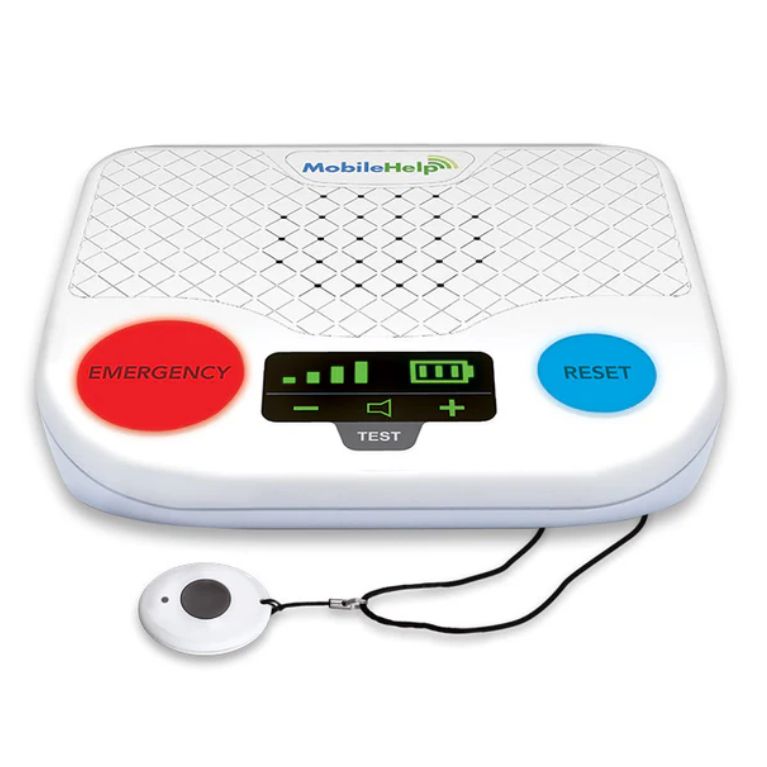
|
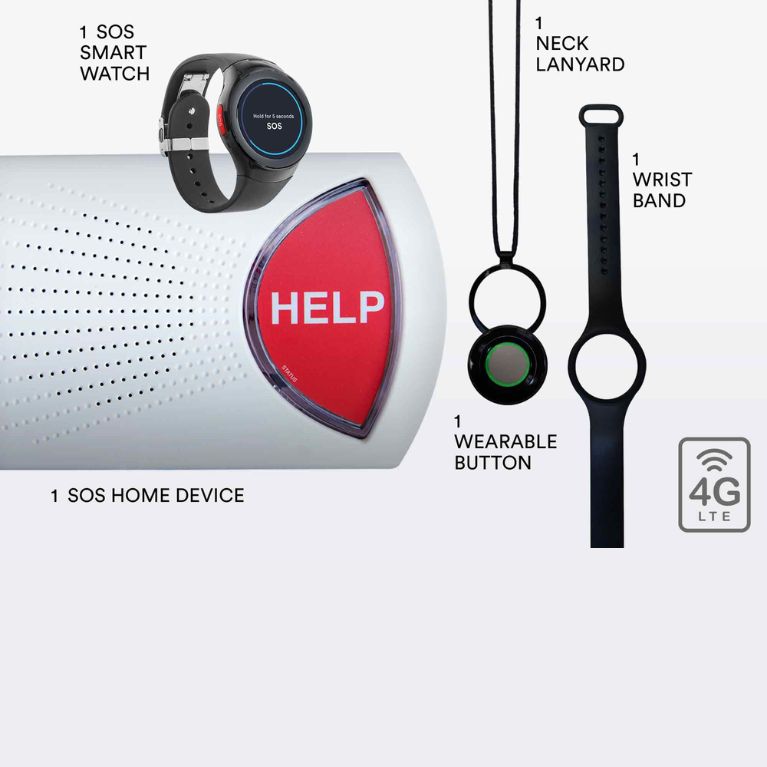
|
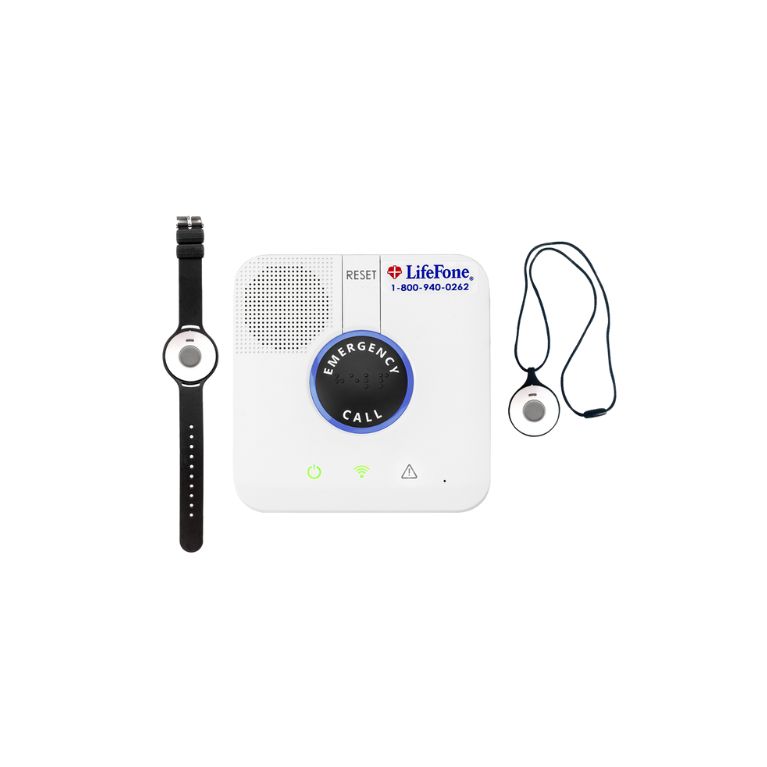
|
|
| Life Alert Micro Voice Pendant and HELP Button | Medical Guardian MGHome Cellular | MobileHelp Classic | Bay Alarm Medical SOS Home | LifeFone At-Home Cellular | |
| Rating | |||||
| Monthly price | $89.85 | $37.95 | $24.95 | $29.95 | $34.95 |
| Equipment fee | $248 | $149.95 | $0 | $0 | $0 |
| Fall detection | N/A | Yes, $10/month | Yes, $11/month | Yes, $10/month | Yes, $5/month |
| Caregiver notification | Call | Call (text and email costs extra) | Call, text, or email | Call | Call, text, or email |
| Battery life (backup) | 72 hours | 32 hours | 30 hours | 32 hours | 32 hours |
| In-home range | 1,000 | 1,400 feet | 1,400 feet | 1,000 feet | 1,300 feet |
All competitors in the table above offer fall detection and have a lower monthly fee than Life Alert. Unlike Life Alert’s Micro Voice Pendant, none of the wearable at-home help buttons have a two-way speaker.
Medical Guardian MG Cellular has a 1,400-foot range and a caregiver app to monitor base unit battery life, emergency call history, medical information, and billing. Wall buttons are available for $2.99–$4.99, but they don’t have a two-way speaker like the Life Alert HELP wall button.
MobileHelp Classic offers one of the lowest starting monthly prices at $24.95—nearly $65 less per month than Life Alert. The Classic also has a 1,400-foot range, a caregiver app, and wall buttons for $2.99 a month.
Bay Alarm Medical SOS Home has the same 1,000-foot range as Life Alert, but its wall buttons don’t have a two-way speaker.
LifeFone At-Home Cellular has a 1,300-foot range and fall detection for only $5 per month (most companies charge $10–$11 per month). The At-Home Cellular doesn’t have a caregiver app or wall buttons.
FAQs
What is Life Alert?
Life Alert is a popular medical alert system company founded in 1987. The company popularized the phrase, “Help, I’ve fallen, and I can’t get up!” Life Alert is synonymous with medical alert systems, but there are many popular medical alert alternatives with more advanced features, lower prices, and better cancelation policies.
How does Life Alert work?
Life Alert medical alert systems connect to a 24/7 monitoring center when the user presses the help button. The monitoring center assesses the situation and alerts loved ones, emergency responders, or both, depending on the situation. The monitoring center agent stays on the line with the user until help arrives.
How much is Life Alert?
Life Alert costs $89.95–$109.85 per month plus a $248 activation fee. The total monthly fee depends on the package, and shipping is included. Pricing information isn’t available on Life Alert’s website. We called the company and received the following cost breakdown:
- Micro Voice Pendant + HELP Button: $89.85 per month
- Micro Voice Pendant + HELP Button + On-the-Go GPS: $109.85 per month
Life Alert’s monthly fees are extremely high compared to many competitors, which charge about $30–$40 monthly.
Does Medicare cover Life Alert?
No, Original Medicare (Part A and B) doesn’t cover Life Alert or other medical alert systems. Some Medicare Advantage (Part C) plans may cover a medical alert system’s full or partial cost. (9, 10) Coverage varies by plan and location, so always check coverage details with your insurance provider. Many states also offer Medicaid waivers that may cover medical alert system costs. (11)
How do you cancel Life Alert?
Life Alert’s three-year contract can only be canceled if the user moves into a long-term care facility, receives full-time care at home, has major health issues, or dies. To cancel Life Alert, you must call customer service and submit proof of these conditions.
Our experts
Dr. Aneesha Dhargalkar
Dr. Aneesha Dhargalkar is a board-certified emergency medicine physician currently practicing in West Chester, PA. She graduated cum laude from John Hopkins University in 2002 and from Jefferson Medical College in 2006. After this, Dr. Dhargalkar attended and completed a three-year residency program in emergency medicine at Temple University Health System. Dr. Dhargalkar is the director of her hospital’s wellness provider program and sits on the executive board of both the Chester County Suicide Prevention Task Force and the Unionville Chadds Ford School District Education Foundation.
Krista Manning
Krista Manning is an accomplished medical copy editor and fact-checker who stands out in the pharmaceutical, health, and wellness domains. With a meticulous eye for detail and a command of medical language, Krista ensures the accuracy and clarity of content. Beyond her professional expertise, Krista is an advocate for mental health awareness. Recognizing the crucial intersection of psychological and physical well-being, she actively contributes to projects that promote mental health awareness within the healthcare narrative. Krista’s commitment extends beyond the pages she edits, emphasizing the holistic nature of health communication.

Emily Breaux
Fortune Recommends Writer
About Author
Emily is a health and wellness writer with a background in marketing and secondary education. She enjoys covering wellness topics that help readers navigate aging, caregiving, sleep, and nutritional health. Emily specializes in medical alert systems and has hand-tested more than 20 devices. Her work has been featured in National Council on Aging, HelpGuide, AgingInPlace.org, and MarketWatch.
Emily is based in New Orleans and enjoys neighborhood walks, practicing yoga, performing in local theatre productions, and finding her next read at the library.
References
- CBC. “I’ve fallen and I can’t get up” – how a cult-classic commercial became a 30-year brand. Accessed October 17, 2024.
- VSi Parylene. The Important Differences Between ‘Water-Resistant’, ‘Waterproof’, and ‘IPX-Rated Waterproof.’ Accessed October 17, 2024.
- Moreland, B. L., Kakara, R., Haddad, Y. K., Shakya, I., Bergen, G. A Descriptive Analysis of Location of Older Adult Falls That Resulted in Emergency Department Visits in the United States, 2015. American Journal of Lifestyle Medicine. 2021; 15(6): 590–597. doi: 10.1177/1559827620942187
- Net World Sports. Football Field Dimensions and Line Guides. Accessed October 16, 2024.
- Appeadu, M. K., Bordoni, B. Falls and Fall Prevention in Older Adults. StatPearls—NCBI Bookshelf. https://www.ncbi.nlm.nih.gov/books/NBK560761/
- Alzheimer’s Association. Wandering. Accessed October 16, 2024.
- MeetCaregivers. Understanding the Different Types of Caregivers Accessed October 16, 2024.
- WebMD. What Are Activities of Daily Living (ADLs)? Accessed October 16, 2024.
- Medicare.gov. Parts of Medicare. Accessed October 16, 2024.
- Medicare.gov. Your Health Plan Options. Accessed October 16, 2024.
- Paying for Senior Care. Personal Emergency Response Services (PERS) & Medicaid. Accessed October 16, 2024.
